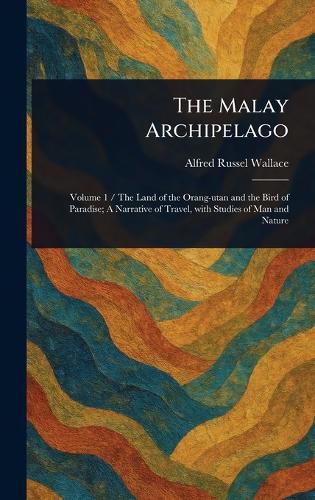Readings Newsletter
Become a Readings Member to make your shopping experience even easier.
Sign in or sign up for free!
You’re not far away from qualifying for FREE standard shipping within Australia
You’ve qualified for FREE standard shipping within Australia
The cart is loading…






This title is printed to order. This book may have been self-published. If so, we cannot guarantee the quality of the content. In the main most books will have gone through the editing process however some may not. We therefore suggest that you be aware of this before ordering this book. If in doubt check either the author or publisher’s details as we are unable to accept any returns unless they are faulty. Please contact us if you have any questions.
Embark on a remarkable journey through the "Malay Archipelago" with renowned naturalist Alfred Russell Wallace. This first volume of two chronicles Wallace's extensive travels and observations throughout the islands of what is now Indonesia.
A treasure trove of natural history and ethnography, this classic travelogue offers invaluable insights into the region's diverse flora, fauna, and cultures. Wallace, a contemporary of Darwin, meticulously documents his findings, famously leading to his independent conception of evolution by natural selection.
Explore the geological wonders and biological uniqueness of the islands, including the famed Wallace Line, a biogeographical boundary separating distinct animal species. This edition preserves Wallace's original text, offering readers a window into 19th-century scientific exploration and a timeless perspective on a fascinating part of the world.
This work has been selected by scholars as being culturally important, and is part of the knowledge base of civilization as we know it.
This work is in the public domain in the United States of America, and possibly other nations. Within the United States, you may freely copy and distribute this work, as no entity (individual or corporate) has a copyright on the body of the work.
Scholars believe, and we concur, that this work is important enough to be preserved, reproduced, and made generally available to the public. We appreciate your support of the preservation process, and thank you for being an important part of keeping this knowledge alive and relevant.
$9.00 standard shipping within Australia
FREE standard shipping within Australia for orders over $100.00
Express & International shipping calculated at checkout
Stock availability can be subject to change without notice. We recommend calling the shop or contacting our online team to check availability of low stock items. Please see our Shopping Online page for more details.
This title is printed to order. This book may have been self-published. If so, we cannot guarantee the quality of the content. In the main most books will have gone through the editing process however some may not. We therefore suggest that you be aware of this before ordering this book. If in doubt check either the author or publisher’s details as we are unable to accept any returns unless they are faulty. Please contact us if you have any questions.
Embark on a remarkable journey through the "Malay Archipelago" with renowned naturalist Alfred Russell Wallace. This first volume of two chronicles Wallace's extensive travels and observations throughout the islands of what is now Indonesia.
A treasure trove of natural history and ethnography, this classic travelogue offers invaluable insights into the region's diverse flora, fauna, and cultures. Wallace, a contemporary of Darwin, meticulously documents his findings, famously leading to his independent conception of evolution by natural selection.
Explore the geological wonders and biological uniqueness of the islands, including the famed Wallace Line, a biogeographical boundary separating distinct animal species. This edition preserves Wallace's original text, offering readers a window into 19th-century scientific exploration and a timeless perspective on a fascinating part of the world.
This work has been selected by scholars as being culturally important, and is part of the knowledge base of civilization as we know it.
This work is in the public domain in the United States of America, and possibly other nations. Within the United States, you may freely copy and distribute this work, as no entity (individual or corporate) has a copyright on the body of the work.
Scholars believe, and we concur, that this work is important enough to be preserved, reproduced, and made generally available to the public. We appreciate your support of the preservation process, and thank you for being an important part of keeping this knowledge alive and relevant.